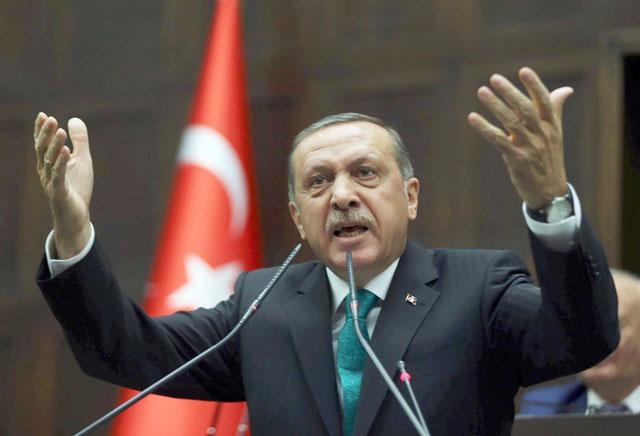You are here
Turkish prosecutors removed as judicial purge intensifies
By AFP - Jan 17,2014 - Last updated at Jan 17,2014

ISTANBUL — Turkey’s government removed a series of high-profile prosecutors on Thursday stepping up a purge of a judiciary Prime Minister Recep Tayyip Erdogan considers embroiled in a plot to undermine him with specious corruption allegations.
The actions hit at the heart of investigations made public on December 17 that have pitched Erdogan into one of the biggest crises of his 11 years in power. They came a day after the government tightened its grip on a panel that controls the appointment of all judges and prosecutors.
Among those removed were the deputy chief prosecutor in the Agean city of Izmir, where arrests in the graft inquiry were made last week, and a judge in the eastern city of Van, where police launched raids this week against Al Qaeda suspects in what Erdogan backers saw as a bid to embarrass the government.
Erdogan remains the most popular politician in Turkey, but it is unclear what effect the current crisis might have as a power struggle continues and March local elections approach.
Erdogan has cast a huge graft inquiry, which has led to the resignation of three ministers and detention of businessmen close to the government, as an attempt by a US-based cleric with influence in police and judiciary to unseat him.
The chief prosecutor and five of his deputies in Istanbul, where the corruption inquiry has been based, were also among 20 people reassigned in the shake-up, the High Council of Judges and Prosecutors (HSYK), headed by the justice minister, said.
There were signs officials appointed to replace those sacked since December were moving to wind down the operation.
The Radikal newspaper said arrest warrants for 45 people, including the prime minister’s son, had been lifted by the new prosecutors and that they would instead be invited to make statements. The Istanbul prosecutor’s office could not immediately be reached for comment.
Those removed also included an Istanbul prosecutor who brought a case against a policeman for firing tear gas at a woman from close range without warning during weeks of anti-government street protests last June. The picture of the woman, wearing a red dress, became a central symbol of the demonstrations Erdogan attributed to a foreign-backed plot.
The reassignments followed a reshuffle in the panel that appoints judges and prosecutors, the HSYK stated, at a meeting on Wednesday. It was the first overseen by new justice minister Bekir Bozdag, in which two members seen as close to the government were given more say over judicial appointments.
“They achieved their goals yesterday with the operation carried out by the minister,” Ali Ozgunduz, a deputy from the main opposition Republican People’s Party.
“It’s all over. This is a clear coup by the executive against the judiciary,” he told a news conference in parliament.
’Parallel state’
Erdogan’s AK Party has tabled reforms that would give government even more control over is the HSYK council, which he argues has been infiltrated by followers of a reclusive Islamic cleric creating a ‘parallel state’ apparatus. He argues the purge serves to restore judicial independence.
A parliamentary commission approved the proposals late on Thursday and they are now expected to be discussed in the general assembly, dominated by the AK Party, next week.
“After this, it makes little difference whether a law is passed or not,” Ozgunduz said of Thursday’s events.
Erdogan’s supporters see US-based Turkish cleric Fethullah Gulen — a former ally whose network of followers is influential in the police and judiciary — as a prime mover in a smear campaign. Erdogan sees the investigation, like the summer demonstrations and riots, as a foreign-backed plot.
They say the ruling AK Party’s proposals to reform the judiciary will make it more, not less, independent by countering the influence of Gulenists within the legal system.
The affair has exposed a deep rift within the political establishment, shaking markets, helping drive the lira to new lows, and prompting expressions of alarm from Washington and Brussels about threats to the independence of the judiciary.
Related Articles
Prime Minister Recep Tayyip Erdogan ordered his ambassadors on Wednesday to confront allies with the “truth” that a graft investigation shaking Ankara was the result of a foreign-backed plot to sabotage Turkey’s international standing.
President Abdullah Gul has dismissed suggestions that outside forces are conspiring against Turkey, openly contradicting Prime Minister Tayyip Erdogan’s assertions that a corruption scandal is part of a foreign-backed plot to undermine him.
Europe voiced its concern Wednesday about the independence of the judiciary in crisis-wracked Turkey as the government embarked on a new purge of the police and moved to curb the powers of the country’s top legal body.
















